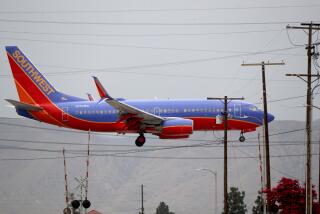Airlines, Heal Thyself
- Share via
This year marks the 20th anniversary of airline deregulation in the United States, and it is under assault. The question is whether various congressional bills being considered this month would resolve negative consequences of a deregulated air industry such as the David-and-Goliath price wars that are blamed for driving small carriers out of markets. The same can be asked of a move to broaden the powers of the Department of Transportation to counteract unfair competition.
Unfortunately, most of these bills constitute a return to artificial regulatory standards. Some seem to be bald-faced attempts to deliver pork back home. Others would subsidize small airlines.
Unfair competitive practices should be handled under existing antitrust laws. This is part of why we have a Justice Department. To shove the Transportation Department deep into determinations of what constitutes unfair competition between airlines would be madness, given the department’s muddy mandate as both booster and safety watchdog over air and ground transportation.
The reasons to be upset over this situation include the persistent sense that the major airlines have crushed their competition, abandoned small to mid-size cities and consistently ratcheted up the price of unrestricted air fares. Passengers can pay three times as much or more per mile to fly out of smaller regional airports than big hubs. And now the airlines, which really have become their own worst enemies, seem to be sneering at antitrust laws with a series of business alliances being described as “non-merger mergers.”
The major airlines counter that air travel has never been more accessible and that fares, overall, are down an inflation-adjusted 36% in the past 20 years.
If there is a consensus that major airlines have become too dominant at their hub airports, there also are ways to address that without writing so much as one new regulation. The Chrysler and General Motors corporations, for example, have said they will sign long-term passenger contracts with Pro Air, and not with Northwest, the dominant carrier operating out of Detroit’s Metro Airport. The Transportation Department already has powers to help emerging airlines by opening up slots at certain major airports, as it did in April for six companies.
The airlines as well can do more for the traveling public, and they know it, given three straight years of full planes and big profits. The first order would be to reduce fares and add service at suffering regional airports. They can either take action or leave it up to the Congress to stumble its way to a legislative solution. The choice should be obvious.
More to Read
Inside the business of entertainment
The Wide Shot brings you news, analysis and insights on everything from streaming wars to production — and what it all means for the future.
You may occasionally receive promotional content from the Los Angeles Times.










